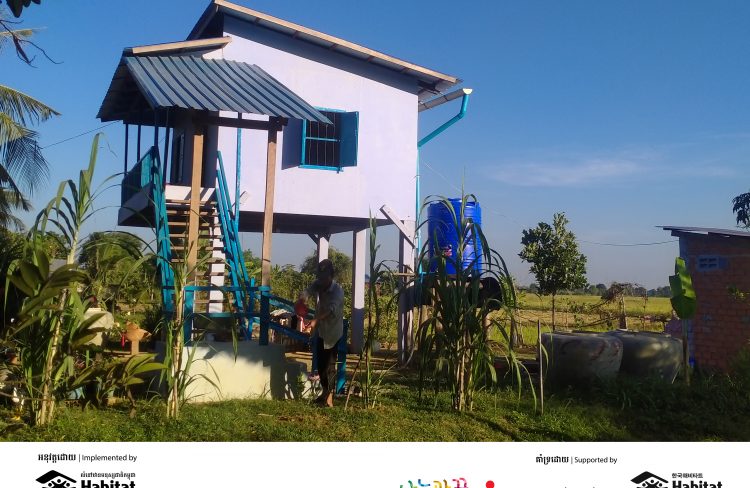Happy to move
Yu Bory, 46, domestic help
Daughter Svay Sreynet, 29
Sons Svay Somnang, 25, and Svay Chanveasna, 18
Four grandchildren
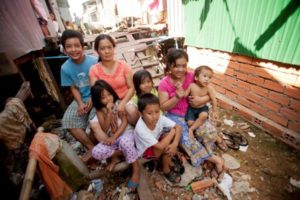
Svay Chanveasna is only 18 years old but he is already looking ahead. He has set his sights on becoming a doctor or engineer so that his mother Yu Bory, who works as a domestic helper, can enjoy her retirement in her very own house.
While Chanveasna studies in Siem Reap with aid from a local non-government organization, his mother, two older siblings and four nieces and nephews live in Phnom Penh.
Yu Bory and her family rent a 3 x 4 meter house for US$20 a month. They have been living in a brick-and-corrugated-metal house in PrekToal village, Stoeung Meanchey commune in Meanchey district for the past five years. While space is tight, it used to be even more cramped when Bory and her family were living with her sister in RusseyKeo commune. “There were 20 people living in a house of the same size as our house now,” said Bory. As her house is built near a rubbish-strewn area, her family has to put up with the mosquitoes and bad odors, especially after the monsoon rains. .
Bory applied to be a home partner with Habitat for Humanity Cambodia after talking to a neighbor who built a house with Habitat. She is aware of the need to save toward the cost of a Habitat house and admitted that it is not easy to do. The average monthly income for Bory’s family is US$120. Bory and her daughter Svay Sreynet, 29, a garment factory worker, each takes home about US$60 a month. Her older son Svay Somnang, 25, supports himself by working as a mechanic. In addition to spending 20,000 riel (US$4.80) a month on water and electricity, expenses sometimes increase if any of Sreynet’s four children fall sick. Sreynet’s four-year-old daughter came down with dengue fever when she was one-and-a-half years old and had to be hospitalized. Her youngest son, aged 1½, also had chest infection.
“It is difficult but I will try to save money because I want to have my own house. I want my children to inherit the house,” said Bory. While the monthly repayment for the Habitat house is equivalent to her rent, she said the difference is that she will own the Habitat house after five years. Currently, Bory sets aside US$15 monthly toward the repayment for her Habitat house. “Nowadays when I go to sleep every night, I will think about the money needed to pay rent,” said Bory. “Compared to Phnom Penh, everything is cheaper in Oudong including education. When I move to Oudong, I plan to set up a grocery shop inside my house.”
Bory’s daughter Sreynet shares her mother’s enthusiasm. “I am happy to move. With our own house, expenses will be cut down. Education is cheaper and the Habitat house will be safer, spacious and comfortable. We will also have fresh air and a better environment.”On his part, Chanveasna said he will be glad if his mother does not have to spend more money on rental. “In Oudong, it will be easy for my mother to earn money to pay for her own house.”
Saving for own house
Chhay Da, 43, motorcycle taxi driver
Wife Chan Keat, 45
Two children
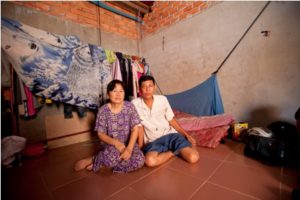
For Chhay Da and his wife Chan Keat, water and heat are twin banes. “Whenever there are heavy rains, flooding will occur and muddy water will come into the house,” said Da. “It is hot in the house, from evening to midnight, because of the metallic roof.” Keat finds their rented house far from the market, the hospital and other amenitiesFor the past three years, the couple has been renting a 4 x 5 meter house on Russey village, Meanchey district in Phnom Penh for US$20 a month. Water and electricity add another 18,000 riel (US$4.30) a month to their expenses.
Da is a motorcycle taxi driver while Keat works in a garment factory. Their combined income averages US$200 a month.
The couple first heard about Habitat for Humanity Cambodia from its staff who went to the village a year ago to introduce Habitat’s program.
Saving money each month is not an alien idea to Da. For the past year, he and his wife have been setting aside US$80 a month. “If I save money for rental, I’m saving it for the landlord but with Habitat, I am saving for my own house.”
Da has a 17-year-old daughter and 12-year-old son who live with his sister-in-law since they were young. “When we move to Oudong, our children can live with us,” said Da. “I am happy that I can also save on paying for water and electricity.”
Da, who said he is a good cook, hopes to open a Khmer restaurant or a coffee shop in the tourist town of Oudong.
Come November, when the Khmer Harvest Build is being held in Oudong, Da will have his first contact with foreigners. “I welcome international volunteers to work together with me to build my house.”
Kudos to volunteers
Bour Narith, 35, motorcycle taxi driver
Wife Paov Synuon, 32
Son Born Chayhour, 11
Daughter Born Meymey, 8
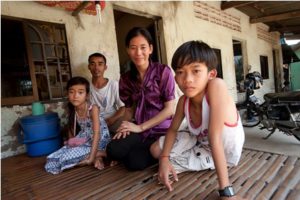
For Bour Narith, 35, practical concerns lie behind taking his children out from school in Phnom Penh and leaving them in the care of his mother in Kampong Cham province. “We do not have enough money, especially to pay for the children’s meals in school.” This has happened often enough that his wife Paov Synuon, 32, said “the children don’t stay long enough in school.”
Narith and Synuonhave an 11-year-old son Born Chayhour and eight-year-old daughter Born Meymey. The family of four currently lives in a rented house in
PrekToal village, Stoeung Meanchey commune, Meanchey district. Narith said: “We had to move from place to place because the rent was not stable.” The couple has been renting since they got married 10 years ago.
The rent is currently US$35 which has gone up by US$5 since July 2011. “We want a Habitat house because we want a stable place and not having to move from time to time.”
Narith thinks that expenses will be reduced when the family moves to Oudong, especially since food is cheaper. “When we stay in Oudong, the children can have permanent education.” The mention of the fresh air in Oudong also brought smiles to the faces of husband and wife.
The couple’s combined income is about US$110 a month. To date, they have contributed US$550 toward the cost of their Habitat house. Synuon raised the money by selling her wedding jewelry.
For the rest of the repayment, Narith said: “I will work hard to save money.” As Oudong is a tourist resort, Narith sees an alternative livelihood in selling handicrafts or running a restaurant.
Meanwhile, Synuon is looking forward to the Khmer Harvest Build in November. “I am happy that a lot of people are coming to build. This is the power of the volunteers.”
The need for Habitat Partnership
POV BOPHA, 39, TAXI DRIVER
Wife Khun Sophea, 34
Sons Pov Piset, 13, and Pov Chan Bora, 10
Daughter Pov Puthida, 4
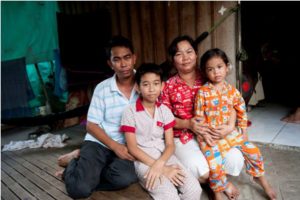
Owning a house was beyond the reach of Pov Bopha until Habitat for Humanity Cambodia came into the picture. He reckons that he needs more than US$10,000 to build a new house and out of that sum, US$7,000 is for the cost of land.
“If I do not work with Habitat, I will not have enough savings to buy a new house,” said Bopha, 39, who drives a motorcycle taxi in Phnom Penh.
Currently, Bopha lives with his wife Khun Sophea, 34, son Pov Piset,, 13, son Pov Chan Bora and daughter Pov Puthida, in a rented house. They share the wooden house with five relatives in PrekToal village, Stoeung Meanchey commune, Meanchey district, Phnom Penh. The monthly rent is about US$20. For water and electricity, they have to pay another 20,000 riel (US$4.80) a month.
The average combined income of Bopha and Sophea, who sells vegetables in the local market is about US$150. For the past year, Bopha has been saving up to US$100 a month.
“I am used to saving for family expenses. It is good to get my own house as I do not want to spend on rent, water and electricity,” said Bopha.
When he moves to Oudong, he wishes to set up a cooked food stall while Sophea is already looking forward to decorating their Habitat house.
As for contributing their own labor, Bopha said: “We are happy to build our house with our own hands.”
Looking forward for bigger house
Khun Mony, 30, motorcycle taxi driver
Wife Norng Chansachak Neary, 28
Sons Khun Daravuth, 5, and Khun Darareach, 2
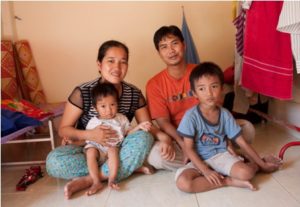
Norng Chansachak Neary believes in being prepared for rainy days. When she got married five years ago, she started saving 5,000 riel (US$1.20) a day. “The savings helped when the children got sick or if we had other needs.”
The 28-year-old vegetable seller said she has no problems saving for her Habitat house. She resumed saving 3,000 to 4,000 riel daily.
Neary and her husband Khun Mony rent a house in Prek Toal village, Stoeung Meanchey commune, Meanchey district, Phnom Penh. They pay a monthly rent of US$30 which includes water and electricity. “The house is hot and small,” said Neary as she looks around the 3 x 4 meter house. She cooks the family’s meals on a portable stove placed on the floor, near the toilet which is inside the house.
As the couple works long hours, their two sons, aged five and two, are looked after by their maternal grandmother.
Neary’s day starts at 4am when she wakes up to buy vegetables from a wholesale market and ends at 6.30pm.Mony also works the whole day as a motorcycle taxi driver.
After moving to Oudong, Neary hopes to continue selling vegetables or chicken or fish. She also plans to plant mango trees at the back of her Habitat house.
Mony is looking at doing the same job in Oudong or staying home to take care of the children. Mony had recovered from tuberculosis while his younger son has been taking medicine for tuberculosis for the past nine months.
“I will be happy to have a bigger house. I will make the house secure and if I have money, I will buy furniture for the house,” said Neary.
For the sake of education
Chum Savy, 40, vegetable seller
Husband Yim Kry, 46, deceased
Sons Yim Bunroth, 19, and Yim Bunroeun, 17
Daughters Yim Sreypin, 15, Yim Sreykot, 10,
Yim Sreykin, 8, and Yim Sreypi, 5
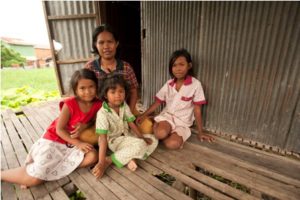
Headaches due to a lack of sleep and worry have prevented Chum Savy from selling vegetables for the past two months. Her husband, a former soldier, died three months ago after he had malaria.
Savy and her three younger children live in PrekToal village, StoeungMeanchey commune, Meanchey district, Phnom Penh. Home is a rented stilt house which stands over ground which is strewn with garbage. The inside of the house is dark even during the day with tiny streaks of light coming through holes in the corrugated metal which is used for walls and roof. For the floor, bamboo slats are laid sparsely across wooden poles.
She pays US$5 a month for rent and another 10,000 riel (US$2.40) for water. There is no electricity and Savy’s family relies on candles at night. She has bought a kerosene lamp which she has not yet used.
Savy currently lives with three of her children, aged five to 10, while her three older children are apprentices at a handicraft center in Siem Reap. Her two sons, aged 19 and 17, and daughter, aged 15, dropped out of school to support the family.
Her 10-year-old daughter Yim Sreykot is in the fourth grade in a government school and can read books meant for seventh graders. Sreykot studies by candlelight or goes to a neighbor’s house which has electricity supply. As her daughter is bright, Savy does not mind spending an additional 1,500 riel in motorcycle taxi fare to send Sreykot to school. “I want my children to get an education. My older children are earning money to support their siblings’ education. My second son said to Sreykot, ‘If you are clever and come in first in class, I will buy you a bicycle. “
Savy can earn 10,000 riel a day from selling vegetables. In addition, her three older children send 150,000 riel a month. While there is just about enough money for household expenses, Savysaid she will depend on her older children to contribute toward the cost of her Habitat house. To date, she has saved US$400.
Savy constantly worries about the poor living conditions. “I am afraid of falling through the bamboo slats. When it rains, water comes through the roof and we have to move within the house to avoid getting wet. Sometimes it gets flooded and because of the strong odor, I cannot eat.”
Savy admits that she thinks a lot and feels discomfort in the chest area. The thought of moving to Oudong, however, is more uplifting for her spirits. “I want to work at the farm,” she said, referring to the 2.4-hectare farmland which is developed by HFH Cambodia in partnership with non-profit organization International Children’s Care, Australia.
“Moving to Oudong will give my family and me a new and better life. I don’t have to worry about rent. I won’t think so much and there will be no headaches.”
Wanted: Healthy environment
Ren Ran, 32, scavenger
Wife Nphim Phy, 33
Son Ren Phearak, 11
Daughters Ren Sreylen, 8, and Ren Sreylin, 4
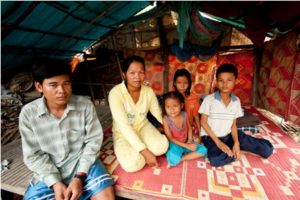
Living for 10 years near a dumpsite may have made Ren Ran more or less immune to odors, mosquitoes and flies but his three children still fall sick about two to three times a month.
After the rains, the ground outside his rented house becomes soggy and a few bricks and small wood blocks are placed on the ground to create a dry path to the house. Up till recently, about 10 people live in the house. Ran and his wife Nphim Phy and three children, aged four to 11, share the space with his mother, brother, nieces and nephews.
Ran and Phy pay US$10 each month for rent with another US$11 spent on water and electricity. The house is a mix of blue-colored boards used for walls and canvas sheets acting as covering. The mud floor manages to stay dry despite the rains.
Ran’s mother now lives in Oudong where she built a house with HFH Cambodia. After a visit, Phy is drawn to the house because of the spaciousness and good environment.
Both Ran and Phy work as scavengers and earn a combined 10,000 riel (US$2.40) a day. Phy saves 2,000 riel daily. Occasionally, Ran supplements the family income by hunting rats at the dump where he scavenges. For every kilogram of rats caught, Ran can earn 6,000 riel.
The couple chooses to work from 5pm to 11pm because the evening is cooler. They take about 30 minutes to walk to the dumpsite, pushing a cart along to collect the rubbish scavenged.
Phy is willing to try all kinds of work when she moves to Oudong. She wants to grow vegetables or raise chicken or pigs. Ran is also looking to change his vocation by growing vegetables or working on the farm project undertaken jointly by HFH Cambodia and International Children’s Care, Australia.
“When I have my own house, it will be a comfortable place, with fresh air and a healthy environment. I want my children to have a good future,” said Phy.
Simple wish
Sung Sophara, 42, motorcycle taxi driver
Wife Pich Channa, 41
Son Song Sakmony, 18
Daughter Song Sakkavy, 4
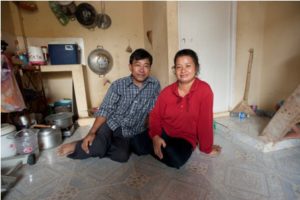
Sung Sophara still remembers his time working at a coffee stall in O Russey market and hopes to do a similar job when he moves to Oudong. Sophara, 42, is a motorcycle taxi driver but his heart lies in business. He desires to set up a coffee-cum-video-rental-shop in Oudong as he knows many families from Phnom Penh will be moving there.
With the move to Oudong, he hopes that his 18-year-old son Song Sakmony can live together with the family. Sakmony is an apprentice for a blacksmith and stays at his employer’s house in Phnom Penh. Meanwhile, Sophara lives with his wife, four-year-old daughter and sister-in-law in a rented house in PrekToal village, StoeungMeanchey commune, Meanchey district, Phnom Penh.
Each month, Sophara pays US$35 rent for a 3 x4 meter house with a loft area. Cooking is done on a stove placed on the floor and is in close proximity to the toilet. The family also pays 15,000 riel (US$3.60) monthly for water supply and US$10 a month for electricity.
Sophara’s house is one of five units in a row and the walls and roof of the loft area are made of corrugated zinc. His wife PichChanna, 41, finds it difficult to get to the garment factory where she works whenever it rains. The ground outside the house, which is already littered with garbage, gets flooded although the dirty water does not get into the house. “There is a bad smell and it is hard to walk or ride the motorcycle,” said Sophara.
He added: “I have lived in this rented house since I got married 20 years ago. The house is too small. I want to have my own house but I cannot afford to buy a new house in Phnom Penh.”
For the past year, Sophara and his wife have been saving toward the cost of a new Habitat house in Oudong. Their combined monthly income is US$110 and they manage to save US$30 a month.
Having worked at a construction site for six months before he got married, Sophara is no stranger to the tasks which he will be doing during the Khmer Harvest Build. For Channa, she is just happy that international volunteers will be helping her family to build their own house.
In Oudong, Sophara not only sees business opportunities for himself but also for his son. “I hope that one day, my son can set up his own blacksmith shop in Oudong.” Channa is content to stay at home to take care of her young daughter Song Sakkavy and help out her husband in his business.
Job opportunities
Nuth Sideth, 30, motorcycle taxi driver
Mother Ros Sabeth, 59
Brothers Nuth Sysada, 28, and Nuth Syranin, 20
Sisters Nuth Syvivya, 25 and Nuth Syramy, 22
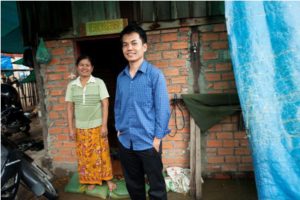
Like many rural migrants, NuthSideth came to the Cambodian capital Phnom Penh in search of better economic opportunities. In his case, he was looking to equip himself with the language skills by enrolling himself into a three-year English course conducted at the Human Resources University.
Sideth works as a motorcycle taxi driver while studying part-time. He earns 10,000 to 15,000 riel (US$2.40 to US$3.60) daily. Sideth was allowed to take leave of absence from his course for up to one term as he had no money to pay for the fees. He is due to complete his course in end-November and he hopes to work as a teacher or translator.
In Phnom Penh, Sideth stays with his uncle and family with 10 people living under one roof. While Sideth does not have to pay rent as he is still studying, he contributes 10,000 riel monthly toward his uncle’s household expenses.
Sideth also gives US$10 to US$20 a month to his widowed mother who lives in their hometown of SvayRolum, about 20 kilometers(12 miles) south of Phnom Penh. Sideth’s mother, RosSabeth, 59, shares a rented house with his four siblings, aged from 20 to 28.
Living in Phnom Penh for the past few years, Sideth is used to flooding which affects the area several times a year. After heavy rain, the waters rise to ankle-length and sometimes overflow into his uncle’s house and make the furniture wet. There were times when Sideth’s feet were cut by stones when he waded through the water to get to the road.
Sideth puts up with the flooding and the mosquitoes because he knows he has a purpose to fulfill in Phnom Penh. Ultimately, he wants to move back to Kandal province so as to take care of his mother. “Back home, my mother has to walk some distance to get water from a well. My mother’s blood pressure is a little high. I came to Phnom Penh to study and for job opportunities. But I want to take care of my mother in Kandal,” said Sideth.
“I am applying for a Habitat house for my mother and siblings. We do not have enough money to buy a new house in Kandal. The rent which my mother pays is not far from Habitat’s monthly repayment but the difference is that after completing the repayment, we will own a house,” said Sideth.
Sideth believes that his younger brother and sister, who both work in a local non-government organization, can chip in to repay the Habitat loan. He is optimistic that he can find some work when he moves to Oudong as there are a number of private schools. “Oudong is a small place but it offers more work than my hometown.”
Space for the children
Ou Samneang, 50, construction worker/scavenger
Wife Ry Mom, 44
Daughters Nheb Chanda, 22, Nheb Ratha, 19, Nheb Malin, 18, Nheb Rathy, 17, Nheb Nimol, 12, Nheb Sreynick, 3
Sons Nheb Ruthea, 8 and Nheb Chamnan, 7
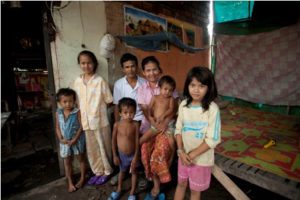
Flies buzz around at meal-times in Ou Samneang’s household but his five children are unfazed especially three-year-old Nheb Sreynick as she tucks into plain rice with a pinch of vegetables provided by an NGO.
Samneang, his wife Ry Mom, and children live in a rented house near the former Stoeung Meanchey dumpsite. His two eldest daughters, aged 22 and 19, are married and live with their husbands’ families. Another daughter Nheb Malin, is a hairdressing apprentice in O Russey market, about half an hour’s ride away.
For the remaining five children who live with Samneang, all are supported by the French-founded Pour Pour un Sourire d’Enfantt, which means For a Child’s Smile. The non-government organization has three offices in Cambodia including one located in the StoeungMeanchey commune which Samneang and his family live. Samneang’s children are among more than 6,000 children to whom PSE provides food, health and schooling among others.
Samneang and his wife have been living in their 20 square meter house for more than 10 years, since the Stoeung Meanchey dumpsite was started, as Mom recalled. They have been paying US$15 a month with another 34,000 riel (US$8) being spent each month on water and electricity. The family built a new pit latrine four months ago with money contributed by Samneang’s third daughter Nheb Malin, a hairdressing apprentice. Both husband and wife work as scavengers, bringing home more than 20,000 riel (US$5.60) a day if Samneang can also find work at construction sites.
Samneang’s goal is to start saving US$50 a month toward repaying the initial deposit for a Habitat house in Oudong. The task is less daunting due to contributions from his two older daughters. “Before, only my husband and I were working but now Malin (third daughter) can help and so can Chanda (eldest daughter),” said Mom. “We could not save previously but now we are more confident because our daughters can help. We have to save because we want to get our own house.”
Forty-four-year-old Mom is making plans ahead. “When I get old and cannot work anymore, I will have my own house where I do not have to pay for water and electricity. I can grow vegetables and rear chicken and pigs. We also need more space for the children as they are growing up.” But for the more immediate future, Mom is thinking of setting up a home-based business in Oudong, selling candy, local cakes and ice cream. For Samneang, construction work is still in his blood. Hence, he is happy and excited at the thought of working with international and local volunteers. “Maybe I can even impart some skills to them,” he said with a slight smile.
Hope for permanence
KANG SAY, 29, garment factory worker
Wife Sin Sopheab, 25
Sons Ing Howhor, 3.5 and Ing Howhor, 1.5
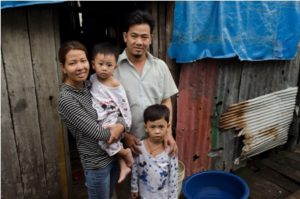
When Kang Say and his wife Sin Sopheab came to Phnom Penh more than two years ago, they had to leave their baby son in the care of his paternal grandparents. “I have low education and cannot find other jobs,” said Sopheab, who works in a garment factory together with her husband.
Their hometown in Svay Rieng province is nearly 130 kilometers southeast of Phnom Penh and the couple sees their two young sons about three to four times a year, during the Khmer new year and other public holidays.
Say and his wife live in Prek Toal village, Stoeung Meanchey commune in Phnom Penh. Home is a house which they built with corrugated metal sheets for its walls and roof and bamboo slats for its floor. The couple’s combined monthly income averages about US$100. They pay US$5 a month in rent for the land on which their house stood and spend 17,000 riel (US$4) monthly on water and electricity.
They first learned of Habitat for Humanity from their neighbor who is the de facto community leader. The neighbor is a Habitat home partner who now lives in Oudong and visits the community frequently. “I want to have my own house so that I do not have to move from place to place because of high rents,” said Sopheab.
Say and his wife plan to continue working in Phnom Penh to earn money after the house is completed in Oudong. Say’s parents will then move to Oudong to look after his sons. “In five years’ time, when we have completed repaying the loan on the Habitat house, the new garment factory should also be ready in Oudong and we can find work there,” said Sopheab.
Sopheab took a loan from her mother who sold her agricultural land to help make the initial US$550 deposit on the Habitat house. Sopheab gets paid for working over-time on Saturday. But if her children are living in Oudong, she is prepared to sacrifice the extra pay in order to visit them over the weekend. “I miss my children very much.”
Health concern
Kim Keomheng, 42, sells traditional Khmer cakes
Sons Oul Rithy, 20, Oul Chanty, 9, and Oul Bunna, 4
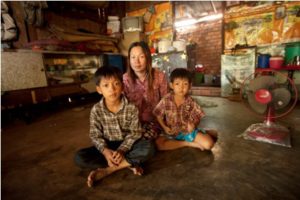
Her family’s health is a major concern with Kim Keomheng. Her two younger sons, aged nine and four, usually fall sick once or twice a month. More than half a year ago, her youngest son Oul Bunna had to stay in hospital for a week after he caught dengue fever. Keomheng suffers from heart palpitations, headaches and giddy spells.
“We have mosquitoes all year round and flies in the morning and afternoon. The house is hot, day and night,” said Keomheng.
Since her divorce three years ago, Keomheng and her sons have been living in a wooden house with corrugated metal roof which is very dark even in the day. They share the 20 square meter house with another family in Prek Toal village, Stoeung Meanchey commune, Meanchey district. Keomheng pays US$15 for rent each month and another 30,000 riel (US$7.30) for her family’s share of water and electricity.
Keomheng, 42, goes around the neighborhood and a nearby factory to sell traditional Khmer cakes from a tray balanced on her head. She can earn about 240,000 riel (US$58) a month. In addition, her 20-year-old son Oul Rithy, who works in a garment factory, helps out with household expenses by contributing US$20 every month. She has started to save US$20-US$30 a month because she wants to have her own house. “Renting a house means a lot of expenses.”
“When we move to Oudong, my children can stay in a safe and comfortable house. Their health will improve because of the fresh air and there will be less risks from mosquitoes,” said Keomheng. She hopes to sell groceries from her Habitat house if she has the capital. Otherwise, she plans to continue selling Khmer traditional cakes.
She added: “I want to build my own house with volunteers from overseas. I have no experience but I am willing to learn. The thought of having a house that belongs to me makes me happy.
Family first
Chann Ly, 49, motorcycle taxi driver
Daughter Yam Sopheak, 20
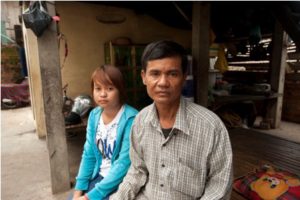
Chann Ly, a 49-year-old motorcycle taxi driver, is no stranger to the practice of saving for family needs. He has been saving US$1 a day with a local non-government organization in order to buy land for his daughter. The Urban Poor Development Fund was set up in 1998 as a joint venture between the Phnom Penh municipality, Community Saving Organization Network and the Asian Coalition for Housing Rights. The UPDF creates a revolving fund which provides affordable credit to poor communities for housing and income generation through their savings groups.
Ly, who is divorced, rents a room in Prey Toal village, Stoeung Meanchey commune, Meanchey district. His 20-year-old daughter Yam Sopheak shares a room with his landlord’s daughter. Each month, Ly pays US$20 for rent and another 14,000 riel (US$3.40) for water and electricity. Ly earns US$125 a month.
For the initial deposit on the Habitat house, Ly has borrowed US$500 from his godmother. He has to save just over US$30 a month to make repayment for the Habitat house. “I will settle down in Oudong and find work. If I really have no choice, I will come to Phnom Penh to work.” Ly is prepared to ply his motorcycle taxi in Phnom Penh and travel back to Oudong at the end of each day.
Ly is keen to work with volunteers in the construction process. “It will be the first time that I will be building anything of my own.”
Ly’s daughter Sopheak intends to finish her last year in high school in Phnom Penh before moving to Oudong to be with her father. But if she is able to gain admission to university, Sopheak intends to further her education in Phnom Penh. She has set her sights on the banking sector, hoping to work in local banks such as ACLEDA.
“I want to take care of my father after I have gotten a job, even after I am married. I love my father very much,” said Sopheak.
Happy saver
Srey Sopha, 29, Vegetable Seller
Husband Nob Phirum, 39
Sons Pich Rysophearith, 13, Pich Rypirun, 7, and Pich Rysothyvan, 3.5
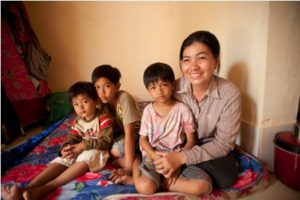
Srey Sopha is well acquainted with the discipline of savings as she has been saving with an informal group at the local market where she sells vegetables. Since a year ago, Sopha has been saving US$30 a month with a 30-member group which includes men as well as women. Members can borrow from the group’s kitty for their immediate needs. According to Sopha, there are benefits of borrowing from the group as the interest rate is lower.
For the past half year, Sopha, her husband Nob Phirum and their three sons have been living in a house which they rent for US$35 a month. They pay another US$5 a month for water and electricity. Sopha and her husband, who works as a driver, bring home about US$100 a month.
At her rented house, mosquitoes are a constant pest. Her seven-year-old son Pich Rypirun had to be hospitalized a few months ago because he had dengue fever. It is also warm inside the house due to a lack of ventilation.
She first heard of Habitat for Humanity from her neighbor in PrekToal village, Stoeung Meanchey commune, Meanchey district, Phnom Penh. She became interested in becoming a Habitat home partner as she said: “I do not have money to rent a house for long. When I am repaying Habitat, it is for a house which I will eventually own.”
Sopha has already saved US$550 as an initial deposit for a Habitat house. She said: “I am happy to save on rent because I can save for my children’s education.”
She is looking forward to working with volunteers during the Khmer Harvest Build. “I want to learn skills from anyone who is willing to teach me.”
When the house is completed in Oudong after the special build, Sopha plans to continue selling vegetables in Phnom Penh. An alternative livelihood will be rearing poultry in Oudong. Her parents who live in Phnom Penh will take care of her eldest son, Pich Rysophearith, 13, who will stay on to continue his studies. Her two younger sons will move to Oudong with her husband.
Ready to work
Sern Mony, 29, Garment factory worker
Mother Sern Yiko, 53
Son Lim Sokhen, 3
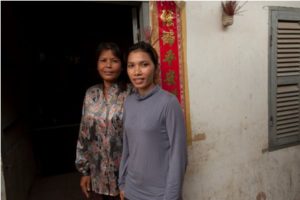
When SernMony first heard of Habitat for Humanity from her neighbor, her curiosity was piqued. At a meeting arranged by her neighbor, Mony learned from a community leader about Habitat’s model of saving to repay for a house.
That meeting took place a year ago. It was several months later before Mony traveled to Oudong to see Habitat’s program for herself. “When I saw the Habitat houses in Oudong, I wanted to live there,” Mony recalled.
The 29-year-old garment factory worker started to save US$50 every two months. “It is difficult to save but I still try because I want my own house,” said Mony who has accumulated over US$200. Half of that sum is a loan from her married sister who lives in their hometown in Takeo province.
Mony’s ex-husband also gives her US$20 every two months for their three-year-old son. Mony earns about US$60 a month with US$35 going to rent. She pays another 17,000 riel (US$1.70) for water and electricity.
For the past three years, Mony has been sharing the 12 square meter rental house with her widowed mother Sern Yiko and son Lim Sokhen. “The house is very hot in the day and stifling at night. We also get mosquitoes,” said Mony. The family lives in Russey village, Stoeung Meanchey commune, Meanchey district, Phnom Penh.
The Khmer Harvest Build will be the turning point for families such as Mony’s who said that having her own house will boost her self-confidence.
Mony plans to give a warm welcome to volunteers who will be building alongside her. “I am ready to work with them,” she said. Mony’s mother has an idea – Mony should learn English to communicate with the volunteers.
After moving to Oudong, Mony wants to continue working in a garment factory. Her mother is thinking of making and selling traditional Khmer cakes to supplement the family’s income. Mony said. “With a new house, my family and I will have a better life. I can also save money for my son.”
Looking forward for stability
Sok Soum, 39, Construction Worker
Wife Kas Chanthy, 32
Son Soum Sam, 11
Daughter Soum Phally, 10
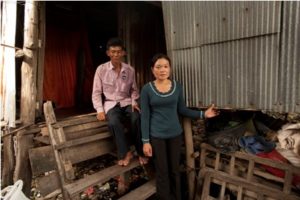
The threat of having to move out at short notice has made it even more urgent for SokSoum to look for a new place. The 39-year-old construction worker pays US$5 a month to rent the land which is a rubbish dumping ground. Paper, plastic and other garbage lay below his stilt house which was built three years ago. The walls are made of corrugated metal while bamboo slats are used for the floor.
“If the land owner wants us to move out, he will have to compensate US$700 per family,” said Soum. “But we do not know when the land owner wants to take the land back. It will be more expensive to rent another place like this in Phnom Penh.” Soum and his family live in Russey village, Stoeung Meanchey commune, Meanchey district in the Cambodian capital.
As a construction worker, Soum can earn 10,000 riel (US$2.40) a day if he can find work. His wife KasChanthy, 32, takes home about US$60 a month as a garment factory worker. Other than rental of the land, Soum also pays 16,000 riel for water and electricity.
The living conditions have affected the family’s health. Soum’s 11-year-old son Soum Sam had dengue fever over a month ago and required a three-day stay in the hospital. Soum and his wife get dizzy spells while the children come down with a cold or fever.
When Soum heard about Habitat for Humanity from the community leader three months ago, he decided to apply to become a home partner. “If I cannot build a house with Habitat, I will have to look for another rental place. It will be more expensive to rent another place like this in Phnom Penh,” said Soum.
He added: “If I have my own house, I can get a job at a fish pond in Oudong. I learned how to rear fish from my older brother.”
“I want my children to study in Oudong. The school in Phnom Penh is three kilometers from my house and the children have to cycle to school on the same bicycle,” Soum said.
Soum’s other wish has to do with legacy. “I want to leave the house as an inheritance for my children.”
Affordable home
Kong Siheng, 61, cleaner/scavenger
Grandson Ly Seyha, 20
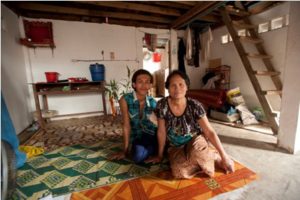
Kong Siheng is used to being on the move. “Poor people always move from place to place,” said the 61-year-old cleaner. For the past four years, she has been renting a room in Russey village, StoeungMeanchey commune, Meanchey district, Phnom Penh.Siheng shares the room with her grandson Ly Seyha, a 20-year-old Khmer art performer. The monthly rent is about US$10 which includes access to water and electricity.
Siheng learned about Habitat for Humanity’s program from a former neighbor who became a Habitat home partner a year ago. “I have never owned a house in my life. I have been renting a room for my whole life but now I have the opportunity to own a house.”
She came to Phnom Penh 10 years ago with her grandson who was then 10 years old. She has been taking care of Ly Seyha when he was seven months old, after his father died and his mother remarried. Seyha did not continue his education after ninth grade because of a lack of money. “No more studying for me because I want to earn money,” said Seyha. He is keen, however, to upgrade his performing skills.
Together, Siheng and Seyha have a combined income of US$90 to US$110 a month. Out of this, they save US$50 each month toward their Habitat house. They have accumulated about US$200 in savings.
“I used to save money but used it for my grandson’s medical and other expenses. Now that I want to get my own house, I have to reduce living expenses so that I can save,” said Siheng. “It is difficult to find a cheap house in Phnom Penh. A Habitat house is more affordable,” she added.
Siheng welcomes the idea of working with international and local volunteers to build her own house. “I want to be closely involved in the construction. If anything is to go wrong, I can make it right and good.”
She has her way of putting volunteers at ease despite not speaking the same language. “I will smile and say hello to make the volunteers feel welcome because I feel happy in my heart.”
Siheng hopes to work from her new home if a garment factory is to be set up in Oudong in the future. She has heard from the village chief in Oudong that women may be recruited to work from home to sew clothes for the factory. “The new house will be a heritage that I will leave behind for my grandson,” she said.
For Seyha, who currently lives with his performing arts troupe in Phnom Penh, his plan is to eventually move to Oudong to stay with his grandmother. “I want to earn more money to make her life comfortable.”
Keeping the family together
Sor Nimol, 32, manicurist/restaurant staff
Husband Yos Phanna, 39
Daughter Sor Raksa, 8
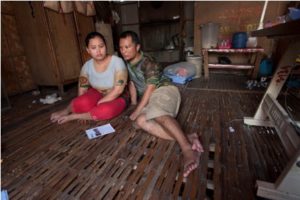
Sor Nimol believes in working hard for her family’s sake. Since her husband suffered a stroke a year ago, she has been working 17 hours daily. In the day, she shares a manicure business with her neighbor in the local market and in the evening, she goes to work in a grilled food restaurant.
Nimol, 32, is married to Yos Phanna, a 39-year-old former electrician. Phanna was unable to walk initially after he had a stroke. He has since regained some mobility though his left arm and leg remained paralyzed.
For the past four months, Nimol and Phanna have been renting a room in Prek Toal village, Stoeung Meanchey commune, Meanchey district, Phnom Penh. The US$20 monthly rent was half of what they used to pay for another place. “We moved here because of the cheaper rent,” said Nimol. The room on stilts, with corrugated iron sheets for walls and roof and bamboo slats for floor, stands over rubbish-strewn ground. “We get a lot of mosquitoes and there is a bad smell after the rains,” said Nimol.
In January 2011, Nimol and Phanna went to Oudong to build toilets with a Habitat volunteer team from overseas. Nimol contributed 100 hours of her own labor, or sweat equity. “I enjoyed the experience. It was hard work but fun.”
Several months later, in August, she revisited Oudong and left with a good impression of Habitat’s houses built with soil blocks. “I like the mortar plastering on the internal walls of the house. There is also fresh air in Oudong.”
“I do not know of any organization other than Habitat which helps families in this way. I want my own house. If I rent, I just spend and spend,” said Nimol. “After completing my repayment, I can get my own place and live together with my daughter.” Her eight-year-old daughter lives with Nimol’s mother in her hometown in Battambang province.
Nimol takes home about US$100 monthly and saves US$30 each month. So far, she has saved US$200 toward the cost of her Habitat house.
Nimol is open to taking on other kinds of work in Oudong. “What people can do, I can do. I have no wish to get rich. I just want to earn enough for my family.”
Familial duty
Chea Sreymom, 31, manicurist/hawker
Husband Keb Mony, 48
Sister Chea Sophy, 20
Mother Bun Sophorn, 60
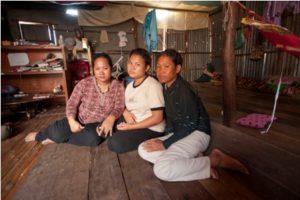
As the eldest in the family, Chea Sreymom feels the weight of her responsibility. She sees it as her duty to work hard for a house so that her family can stay together.
Sreymom, 31, shares a manicure business in the local market in Phnom Penh with her neighbor. Each evening, from 6pm to 9pm, she carries a tray on her head to sell food around the riverside which is a popular tourist haunt.
Home for Sreymom is a rented room in Russey village, Stoeung Meanchey commune, Meanchey district. She shares a 3 x 6 meter room with another family, with up to eight people under one roof. The room is among a few rooms partitioned for rent inside a long, stilt house made of corrugated metal walls and bamboo/woodenfloor. Sreymom pays US$5 monthly rent with another 15,000 riel each month for water and electricity. A toilet – wooden walls provide some privacy for a hole through the bamboo floor – is shared by three families.
Her fellow tenants include her young sister CheaSophy, 20, who is a waitress in a restaurant along the riverside. Sreymom’s husband KebMony, 48, is a soldier stationed in Prey Vihear province and visits her once a month, staying for two days each time.
‘Life is difficult. It is hard to raise a family when I have no house. I am not sure when the landlord wants to take back this place,” said Sreymom.
When she visited the Habitat community in Oudong recently, she was struck by the quiet neighborhood and friendly residents. “I like the Habitat houses there. They are spacious and the walls and floor are good.”
Sreymom sets aside US$1 a day which she keeps in a box reserved for her savings. So far, she has saved US$190. Sreymom’s monthly income is about US$55 a month including an allowance from her husband.
Looking ahead, she said: “At first, my mother will move to Oudong while I will continue working in Phnom Penh to earn more money to repay Habitat.” When Sreymom moves to Oudong eventually, she plans to sell fish and seasonal fruit. “I am happy that Habitat helps but I also need to help myself.”
Sreymom’s mother, Bun Sophorn, 60, lives in an informal settlement near the railway tracks about 30-minutes’ ride away. A 1.5 x 1.5 meter wooden platform serves as a table to sell goods such as small gas canisters of cooking fuel, bottled drinks and snacks. At night, Sophorn will keep her wares and use the platform as her bed, covering the stall with canvas sheets for privacy and some sense of security. While her takings are meager, Sophorn sees the importance of earning her keep.
Being able to contribute is also important to Sreymom. “I know that building a house is hard work but I am prepared. I hope to settle down in my own house and live a better life.”
Looking ahead
Nob Nak, 40, scavenger
Wife Thin Soklin, 32
Sons Thin Narin, 10
Niece Rin Nary, 10
Nephew Rin Sony
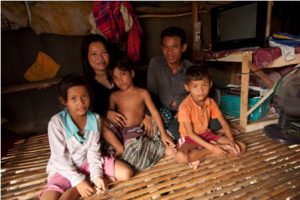
Nob Nak’s dream job is in farming though it was 18 years since he last worked the land. The 40-year-old scavenger used to be a farmer in Kampong Thom province. He was given agricultural land before the Pol Pot regime but lost his rights when there were conflicting claims.
For nearly a decade, he has been living in a 3 x 4 meter stilt house which he built in one day with the help of his neighbor. He spent US$150 to buy building materials such as bamboo slats for the floor and salvaged corrugated iron sheets for the walls. “I had to complete building the house in one day or we would have no place to sleep,” said Nak who lives with his wife, son, niece and nephew in Russey village, Stoeung Meanchey commune, Meanchey district, Phnom Penh.
They pay US$5 a month to rent the land on which their house stands. Water and electricity expenses come up to 50,000 riel each month.
Nak’s wife Thin Soklin, 32, works in a local garment factory and takes home US$50 a month. As a scavenger, Nak earns about US$1 a day.
For Nak’s family, health is a major concern. Both his wife and his son have stomach problems. “When my wife and I leave for work, the children stay at home and sometimes they may drink dirty water which makes them sick,” said Nak. With the nearest hospital about 7km. away, the family goes to a nearby pharmacy for medicine.
Through slits between widely spaced floor slats, plastic, paper and other rubbish can be seen. After heavy rains, the ground below the stilt house becomes a soggy mess.
The roof leaks a little in rainy weather and mosquitoes are kept at bay with the use of mosquito net when they sleep.
When the family moves to Oudong, Nak is thinking of a different job. “I want to raise chicken, rear fish, plant mushrooms and trees. I want to buy a motorcycle and go around selling fish.”
His wife prefers to stay in the same line of work or to start a home-based business to make rice wine. “If we raise chicken or pigs, they can eat the rice too.”
Ultimately, the move to Oudong is for the family’s future. “I hope the children can have a good and healthy environment to grow up in,” said Soklin.
Good future for our children
Chin Vor, 42, Scavenger/construction worker
Wife Nov Saroeun, 31
Daughter Vor Navy, 10 and Vor Chanthy, 5
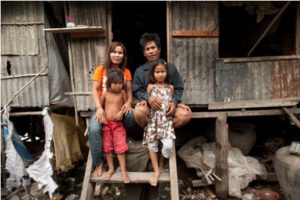
A bad experience with a local organization has not deterred Nov Saroeun from saving again. The 31-year-old garment factory worker had saved for four years with a local association for the purpose of buying land in Kampot province. But the director of the association made off with the members’ savings including Sarouen’s US$500 and the association closed down. Although the director landed in jail, Saroeun’s hard-earned savings was gone.
When Saroeun learned about Habitat for Humanity Cambodia’s program in May 2011, she decided to start saving again. “I believe in Habitat.”
Since August 2011, Saroeun has been saving US$15 a month. Her family’s monthly income is about US$75 a month, going up to US$160 if her husband can find work at construction sites. Her husband Chin Vor, 42, scavenges at a local dumpsite.
Currently, the couple and their two daughters live in a house in Russey village, Stoeung Meanchey commune, Meanchey district, Phnom Penh. Monthly rent is US$5 for the land while water and electricity expenses total 50,000 riel a month.
Vor built their stilt house with the help of neighbors more than 10 years ago. “We have a lot of problems living here. We have flood waters and the smell is not good. It affects our health. I get a cold about twice a month. My youngest daughter had dengue four years ago,” said Saroeun.
“My husband and I are both orphans. We have no land and we will never get to own land or have our own house. There is nobody to help us. Whenever we hear of NGOs giving land, we would go to see them but we were always disappointed,” said Saroeun.
According to Saroeun, her husband used to own some land in his hometown in Prey Veng province. But Vor sold the land to help pay for funeral expenses when his mother died two years ago.
But things are looking up. “I am happy and excited to work with Habitat,” said Saroeun who wants to greet Habitat for Humanity volunteers and thank them for their help. With his construction experience, Vor hopes that he can impart some skills to volunteers during house construction. “I can show by demonstration even though I cannot speak English,” said Vor.
“We want a good future for our children,” said Saroeun.
Stepping stone to better life
Hun Salen, 31, motocycle taxi driver/blacksmith
Wife Lun Sokleng, 29
Daughter Khun Nita, 6
Son Khun Darong, 1½
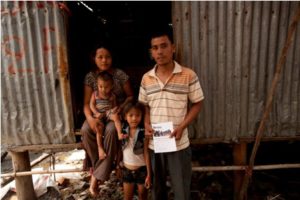
Monsoon rains spell problems for Hun Salen and his family of four who live in a stilt house built over a former rubbish dumping ground. “There is flooding and bad smell,” said Salen, 31, who drives a motorcycle taxi. The damp means his one-and-a-half-year-old son Khun Darong sometimes has lung problems. There was a time when Darong had to take cough medicine every day for several months.
Salen spent US$200 to build the house three years with the help of some neighbors. Corrugated metal is used for the roof and walls while the floor is made of bamboo slats. Zinc sheets hide the toilet which is basically an opening through the floor.
The family lives in Russey village, Stoeung Meanchey commune, Meanchey district, Phnom Penh. Each month, they pay US$5 for rental of the land and another US$10 monthly for water and electricity.
When Salen first heard about Habitat for Humanity Cambodia from the local community leader, he was glad. “I want to reduce expenses for rent. I am happy if I can build my own house with Habitat.” His wife Lun Soklengfirst saw Habitat houses when she visited Oudong in June 2011. “I wish to have a house just like those in Oudong,” said Sokleng.
A year ago, Salen started to save US$25 a month with the aim of buying a house. “It is not a problem to save,” said Salen, who proudly showed his savings booklet after handing over US$100 to a HFH Cambodia staff member. Salen’s family income is about US$150 a month. Occasionally, he also gets work as a blacksmith.
Both Salen and Sokleng wish to have their own house with a view to long-term benefits. “I want to give an inheritance to my children,” said Salen. “A permanent house is a stepping stone to better health and education,” said Sokleng.

